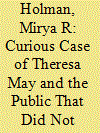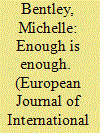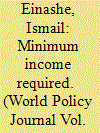| Srl | Item |
| 1 |
ID:
184304


|
|
|
|
|
| Summary/Abstract |
Terrorist attacks routinely produce rallies for incumbent men in the executive office. With scarce cases, there has been little consideration of terrorism’s consequences for evaluations of sitting women executives. Fusing research on rallies with scholarship on women in politics, we derive a gender-revised framework wherein the public will be less inclined to rally around women when terrorists attack. A critical case is UK Prime Minister Theresa May, a right-leaning incumbent with security experience. Employing a natural experiment, we demonstrate that the public fails to rally after the 2017 Manchester Arena attack. Instead, evaluations of May decrease, with sharp declines among those holding negatives views about women. We further show May’s party loses votes in areas closer to the attack. We then find support for the argument in a multinational test. We conclude that conventional theory on rally events requires revision: women leaders cannot count on rallies following major terrorist attacks.
|
|
|
|
|
|
|
|
|
|
|
|
|
|
|
|
| 2 |
ID:
161270


|
|
|
|
|
| Summary/Abstract |
The clash between national security and civil rights comprises one of the most controversial aspects of counter-radicalisation strategy. Analysts present this as a conflict between the need for restrictive security measures (for example, surveillance) and the need to uphold civil liberties (for example, privacy and freedom of speech). In responding to this dilemma, the article examines how this binary normative struggle impacts on the rhetorical presentation of counter-radicalisation policies – in particular, the UK Prevent Strategy and the rhetoric employed by UK Prime Minister and former Home Secretary, Theresa May. It argues that the normative environment has obliged May to construct rhetoric within the context of, what is termed here, normative invalidation. In facing two comparably compelling and related norms of action, May is necessarily required to invalidate or neutralise any norm not adhered to as an essential characteristic of rhetorical strategy. This is discussed in relation to the Strategic Narratives
|
|
|
|
|
|
|
|
|
|
|
|
|
|
|
|
| 3 |
ID:
155542


|
|
|
|
|
| Summary/Abstract |
Britain’s “minimum income requirement” restricts citizens and legal residents who earn less than £18,600 ($24,000) from bringing their spouses from outside Europe to live with them. Journalist Ismail Einashe looks at the consequences of this threshold, advanced by now-Prime Minister Theresa May when she was home secretary, on parents and children. Einashe describes how the 2012 law has created thousands of “Skype families” who go years without seeing one another, and how its opponents warn it will lead to a brain drain from the United Kingdom.
|
|
|
|
|
|
|
|
|
|
|
|
|
|
|
|